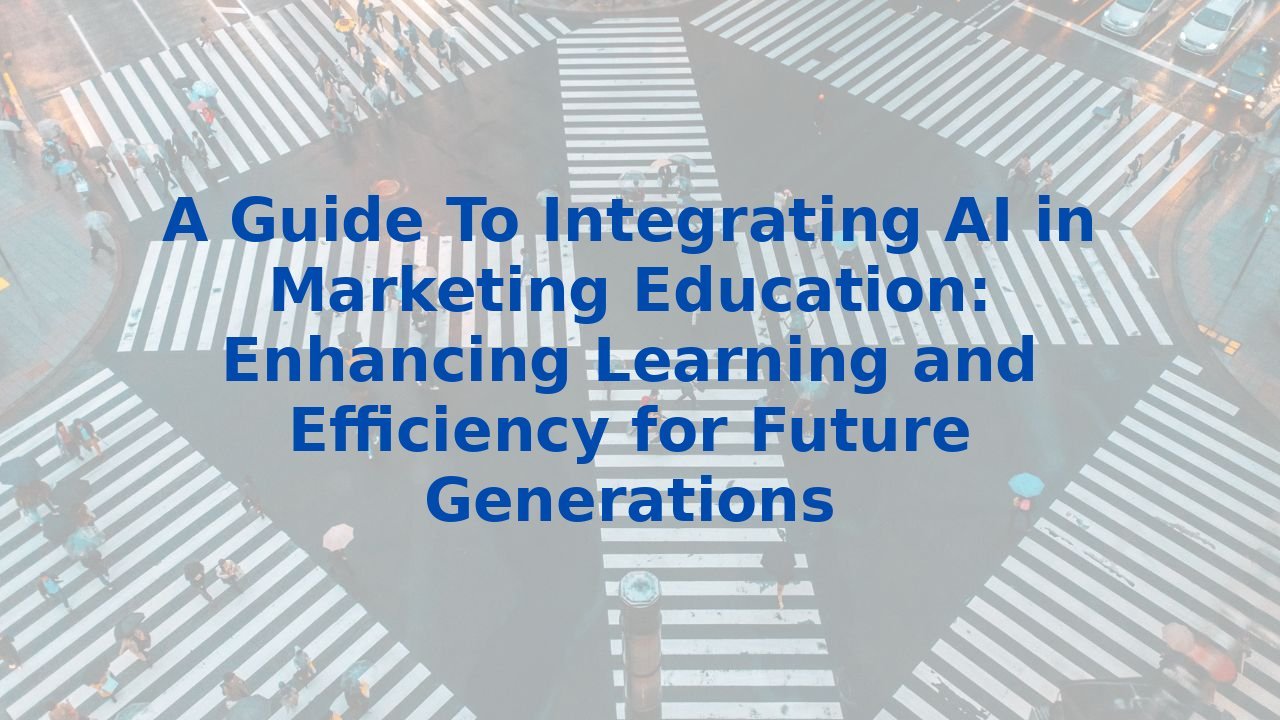A Guide To Integrating AI in Marketing Education: Enhancing Learning and Efficiency for Future Generations
A Guide To Integrating AI in Marketing Education: Enhancing Learning and Efficiency for Future Generations
Introduction
In an era defined by rapid technological advancement, integrating Artificial Intelligence (AI) into marketing education has become not just beneficial but essential for the survival and growth of educational institutions. This article aims to dissect how AI enhances crucial business processes in marketing education, highlighting its potential to improve efficiency and redefine student experiences. We'll also explore the importance of training employees to harness AI’s full potential in this fascinating landscape.
Why AI is Important in Marketing Education
AI's transformative power is evident in its ability to meet the dynamic needs of students and educators alike. One compelling example is the use of AI-driven chatbots that assist students in navigating their academic journeys seamlessly. This technology facilitates timely communication, allowing institutions to foster stronger relationships with prospective and existing students. Ultimately, leveraging AI in marketing education enables the crafting of personalized campaigns—based on individual student data—that resonate on a deeper level.
Enhancing Student Experiences with AI
The application of AI extends across various channels, including social media management, content creation, and communication with alumni. By harnessing AI for personalization, institutions can create tailored outreach strategies that genuinely connect with students. Visual elements play a crucial role here; for instance, AI can generate customized infographics and graphics that make communications more engaging. This not only captures student attention but also enriches their overall experience.
Practical Steps for AI Adoption
To embark on the journey of efficacious AI integration, institutions can follow these pragmatic steps:
1. Data Analysis and Prediction: Employ machine learning algorithms to sift through historical data, enabling higher ed marketers to tailor content and predict future behaviors with remarkable accuracy.
2. Content Creation: Leverage AI-powered design tools to create eye-catching infographics and illustrations. This practice not only enhances storytelling but also significantly boosts social media engagement.
3. Chatbots and Virtual Assistants: Implement round-the-clock virtual assistants to ease the academic experience for existing and prospective students, thus enhancing satisfaction.
4. Email Marketing Automation: Automate email campaigns using intelligent tools to ensure timely and relevant engagement, effectively nurturing relationships with prospective students.
5. Predictive Content Strategy: Develop content strategies based on data insights to engage students meaningfully, thus driving engagement and conversion rates.
Benefits of AI for Efficiency
Integrating AI into marketing education offers a plethora of benefits that collectively enhance operational efficiency:
- Automation of Administrative Tasks: AI minimizes the time spent on administrative duties, allowing educators to concentrate on meaningful interactions and strategy development.
- Personalization: Leveraging AI-driven tools enables the creation of personalized content that resonates with students' unique interests, significantly enhancing their engagement.
- Data Insights: AI empowers educators with actionable insights into student behavior and preferences, thus facilitating informed decision-making processes.
- Scalability: AI tools can process large volumes of data and tasks, simplifying the management of extensive marketing campaigns.
Benefits of Training Employees for AI
While adopting AI technologies is vital, equally significant is the training provided to employees. The following points illustrate the importance of this initiative:
- Understanding AI Tools: Comprehensive training ensures staff is equipped to utilize AI tools effectively, enhancing the overall marketing strategy.
- Ethical Considerations: Discussions surrounding the ethical implications of AI usage are essential for responsible application within educational contexts.
- Adaptability: A well-trained workforce is better positioned to adapt to the ever-evolving landscape of marketing and education, enhancing institutional value.
Conclusion
In summation, the integration of AI in marketing education transcends mere technology adoption; it is about reimagining the learning experience and improving operational efficiency. By following the outlined practical steps and recognizing the profound benefits of AI, institutions are positioned to future-proof their curricula through ethical and effective AI integration. Moreover, investing in employee training ensures that educational leaders harness the transformative power of AI responsibly, leading to meaningful improvements in marketing and recruitment strategies.
Are you ready to embrace AI in your organization? Discover how Complete AI Training can equip your entire workforce with the necessary AI skills for a promising future.



